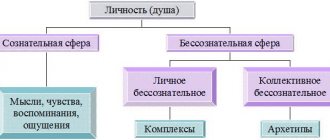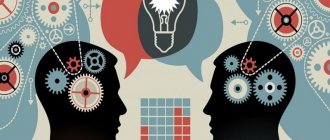Today in psychology there are about fifty theories of personality. Each of them examines and interprets in its own way how personality is formed. But they all agree that a person goes through the stages of personality development in a way that no one has lived before him, and no one will live after him.
Why is one person loved, respected, successful in all spheres of life, while another degrades and becomes unhappy? To answer this question, you need to know the personality formation factors that influenced the life of a particular person. It is important how the stages of personality formation went through, what new traits, qualities, properties and abilities appeared during life, and to take into account the role of the family in the formation of personality.
In psychology there are several definitions of this concept. The definition in a philosophical sense is a value for the sake of and thanks to which society develops.
The most common of them are: personality is a person considered as a system of socially conditioned psychological characteristics; a set of human qualities that he acquires by communicating and acting in a sociocultural environment.
It is generally accepted that the word “personality” comes from the Latin persona (or English personality), but it would be more accurate to translate it as the English self – self, I myself.
Persona is a mask that an actor in ancient Greek theater wore when playing a role. But personality is not just a face, a mask that a person “puts on” in society.
A person manifests himself in social connections and relationships. Individual characteristics are stable and determine actions that are significant for the individual and his environment. The formation of a personality is a long process; one does not “put it on” oneself, one becomes one.
Distinctive personality traits
Personality properties are a set of innate and acquired characteristics of a person that underlie his activities and relationships with people around him and the world. In psychology, the main personality properties on which interaction with society depends are character, temperament, will, abilities, motivation and emotions.
In psychology, character is understood as an acquired way of relating to other people. It includes a certain manner of behavior, as well as a reaction to events happening to a person. Character can be soft and delicate, or rude and unceremonious.
Will means a person’s ability to control his psyche, control his actions, behavior, react in a certain way to what is happening, and bring changes to the world around him. Willpower is usually talked about when it is necessary to make important, conscious decisions, the implementation of which requires the application of certain efforts and overcoming obstacles.
Will is associated with self-restraint, self-control, the need to give up something to achieve a goal, that is, a person must sacrifice something momentary, but attractive to him, in order to get the distant desired.
The main feature of will is that, having achieved a result, a person experiences moral satisfaction.
Afterword
Personal development is a difficult and contradictory process that continues throughout life. A stop in development is fraught with degradation and disintegration of personality.
Personality formation is a purposeful and organized process. At first it is organized by the parents and the child’s environment, and later by the person himself and the environment.
Thus, the formation and development of personality occurs in the process of human interaction with the outside world and people. However, in order to become a person, you need to learn to set boundaries between the understanding of “yourself” and “not yourself.” What does it mean:
- participation in the life of society, but not total dissolution in it;
- the ability to resist and maintain individuality.
Recently, it has been important to talk not only about the creative element of personality, but also about the creative principle, which means “being the creator of life.”
The question of the boundaries of the influence of the biological and social in a person during the development of personality has not yet been settled. Gene research continues. Scientists do not rule out that in the future some phenomena recognized as acquired will actually be transferred to the category of hereditary ones.
Leading factors influencing a person’s personality
Positive character traits of a person - what they include
In sociology, personality is a set of important social qualities that characterize a person as a part of society. A developed person is the opposite of a mass personality; he is distinguished by the desire to move forward, the desire to achieve results.
Personality among the crowd
Factors are divided into external and internal. External ones are living conditions and relationships in society, internal ones are a person’s personal activity.
Among all the factors, the main ones are:
- Heredity is a set of skills that are passed on to a newborn from its parents. Each person has his own genotype, which determines hereditary predisposition;
- Education is a system of artificially instilled skills and abilities. The upbringing of the child in childhood and his desire to independently continue his development at a conscious age depend on the parents. This also includes pedagogical education at school, the formation of safe individual behavior;
- Environment is a set of conditions and circumstances under which a person grows, learns and interacts with his environment. The environment can be geographical - the boundaries of the country of residence, its climate and traditions. The home environment means the living conditions of an individual family, the social environment means the person’s environment.
Note! The hereditary factor influences life, but a person’s desire to succeed in any area can be stronger than genetics. For example, a hereditary predisposition to the exact sciences does not mean that a person will not be able to achieve success in creativity.
Self-awareness as a separate component and sign of personality development
Self-awareness (the product of which is the self-concept) is actively formed in adolescence, although its emergence begins much earlier. It flows from the consciousness of the individual. This is a system of attitudes, an attitude towards oneself. You can read more about self-awareness in the article “Self-awareness - what is it in psychology. Its structure and functions."
How a person’s environment is formed
Every person tries to create an environment around himself that would in every possible way contribute to his development and self-improvement. At the same time, he should not feel constrained and restless. After all, everyone understands that it is much easier to develop in an environment where all other people also strive to improve and improve their lives.
According to scientists, the influence of the environment on each individual person is almost invisible, but has a very powerful effect. Therefore, it is necessary to try to create an environment around yourself exclusively of successful and interesting people. To create a successful environment, you must follow the following principles:
- Always look for opportunities to meet and communicate with interesting and successful people. When talking with them, you can always glean some important and necessary information. However, you should remember that you yourself must be somehow interesting to this person.
- Study the works of interesting people. This could be an autobiography, a book, video or audio material. You can learn a lot of useful things from them.
- Develop diversified. This includes various habits and hobbies: morning workouts in the open air, yoga classes, trainings, seminars, etc. At such events, you can often meet like-minded people and form a successful environment.
Creating an environment means continuously working to improve yourself, at every moment and in any area.
To improve yourself, you need to set more complex tasks and goals for yourself each time. Depending on age and social status, they can be completely different, but the main factor must remain unchanged, that any activity must be aimed at improving the individual as a person.
Culture and art
The role of art in the formation of personality is also important and is the basis for the formation of a person as an individual. Understanding the world around us, studying history, immersing ourselves in art - all this helps to develop beyond the basic needs for food and socialization. Art is not the determining factor; the role of society in creating individuality is much more important. But it helps:
- think more broadly and critically;
- protect your “I” from mass views;
- find harmony between yourself and the world around you;
- express yourself;
- understand your inner world;
- destroy stereotypes, attitudes, social constructs.
Without immersion in culture and art, it is unlikely that you will be able to expand the boundaries of your own consciousness, go beyond the narrow boundaries of upbringing, and step over the pressure of society.
Social environment
This factor has a strong influence on personality change. Many researchers have attached importance to the environment.
For example, one researcher, in his work, compiled the theories of some scientists - Aristotle, Hippocrates, Confucius, based on which the difference in individual actions lies in climatic, geographical and other natural factors.
People who grew up in different conditions can be very different from each other. Of course, not only geographical or climatic conditions can be attributed to the physical environment. There is a so-called SOCIAL environment, which has no less influence on the development of a person as an individual. From the very first years of life, the social foundation is laid. It is during these years that children absorb all information like a sponge.
See also: Under what conditions is a child’s personal growth possible?
If we divide human socialization into groups, we can distinguish several:
- Childhood period . The development of personality is greatly influenced by nothing other than parental opinion. Those habits that are instilled in a child from childhood will remain with him throughout his life.
- Preschool . In the preschool period, the influence is exerted by the children who are nearby at that moment. Who also study in kindergarten. The child learns to build his relationships with other children and teachers. The child changes by imitating the “popular” children. Habits and even character may change.
- Teenage. During adolescence, children are faced with the problem of sharp differences in the behavior of the social group around them. This often causes a teenage crisis, which is characterized by a spirit of rebellion, the desire to do something individually, not like everyone else, and not as accepted in society.
- Youthful . At adolescence, the active period of merging with society ends. Important changes are now taking place both physically and psychologically. There is a recognition of your “I”, your purpose in life. One can observe a continuous search for moral values related to the meaning of life.
See also: Is it possible to increase immunity through fitness?
Family education
The child receives his first social skills in the family. It determines what a person will strive for in life. Either he will strive for knowledge, or he will be content with the patriarchal way of life. If parents find time to develop the child (read books, teach him to sing and recite poetry), then he begins to strive for knowledge. Such children do well at school and the educational material is easy for them.
Parenting in a family can be purposeful or chaotic. Purposeful education aims at the organized process of teaching a child the rules of behavior in society, basic moral values, and good manners. Chaotic parenting is based on trial and error. The child learns the basic concepts of good and evil, the methods of chaotic education are extremely simple - carrot and stick.
Success in raising a child is promoted by:
- conscious approach of parents to the process;
- consistency with the educational program in kindergarten;
- consistency of parenting methods between father and mother;
- the authority of the parents in the eyes of the child;
- correct relationship between spouses.
If parents ask themselves about proper upbringing and study the relevant literature, this has a great influence on the final result. The consistency of educational methods in the family and in kindergarten has a great positive impact on the child. For example, if etiquette rules are instilled in kindergarten, then at home they should be practically reinforced.
The consistency of educational techniques between the father and mother of the child is the key to the successful development of the little person. But when one parent demands obedience from the child, and the second indulges the whims in every possible way, this will negatively affect the worldview and ethical qualities of the little person. He will learn to be a hypocrite and adapt to please both dad and mom.
Correct relationships between spouses are a small school of life for a child. He sees how to build his relationships with other people. If mom and dad are constantly in conflict, then they are demonstrating a negative role model.
It is also important to masterfully combine in the educational process:
- Love;
- severity;
- respect. to the individual.
Education without love is incomplete, so they try to give children up for adoption so that they can experience family life and self-love. Love is impossible without respect for the child's personality. Thus, parents form self-esteem in him, first of all.
Without rigor, the educational process is impossible. Frameworks and prohibitions are needed - the child must know that violation follows punishment.
At what age does personality development occur?
Psychologists say that a person develops unevenly at different periods of life. Up to a certain age, children actively learn new things, after which their development slows down.
How development changes at different ages:
- In preschool age, the child learns general knowledge from parents and educators, which will serve as the basis for further development;
- At the age of 6-16 years, a child is influenced by all factors in the formation of a full-fledged personality; upbringing and socialization play the main role. Beliefs, personal opinions and outlook on life are formed;
- From 17 to 26 years of age, maximum receptivity to learning, the ability to analyze and draw conclusions are observed. It is at this age that a person receives higher education in the chosen field of activity;
- Between 26 and 30 years, processes slow down, a decline in attention and memory loss are observed;
- By the age of 30-34, a new leap in development may occur, when a person begins to master his chosen profession in practice, his brain is actively working;
- At 35-40 years old, the individual continues to develop according to the same pattern, but at a slower pace;
- After 40 years, the level of thinking, memory and attention decreases.
Note! Age cannot limit personal desire. Some people actively develop from 18 to 25 years old, after which they decline. By the age of 30, some people find their place in life, change jobs and social circles.
Throughout their lives, people grow and gain new knowledge and skills. In pedagogy, the factors of development of a full-fledged personality are the driving forces that contribute to the realization of a person. A successful personality type is not inherited; human development is largely influenced by upbringing and environment.
Stages of socialization
Factors influencing the development of personality in a team can be traced using the example of a child’s socialization at school:
- adaptation;
- integration;
- self-development;
- self-regulation.
When joining a new team, a person needs some time to adapt. He carefully looks at the unfamiliar environment, tries to understand and accept new rules of behavior. This time is associated with the study of a new social group.
Next, integration occurs, that is, the individual joins the new team and becomes part of it. Here it is important to fully comply with the rules of behavior in society and not interfere with someone else’s monastery with its own charter.
Having integrated into society, the personality begins to develop. This is a relatively calm period when all conditions are created for acquiring and developing new skills. As a person gets used to new conditions, he begins to regulate his behavior in accordance with the mentality of a given society.
However, society can have both positive and negative influences on an individual. If students in the class do not strive to gain knowledge, then the newcomer can also reduce his performance indicators. And vice versa, if there are strong students in the class, the beginner also begins to gravitate towards their level of knowledge. Children tend to imitate.
Successful integration and self-development of the student will be facilitated by an atmosphere of friendliness and respect at school, a trusting relationship with teachers and the class teacher. In a hostile environment, academic performance will decline and self-development may stop.










